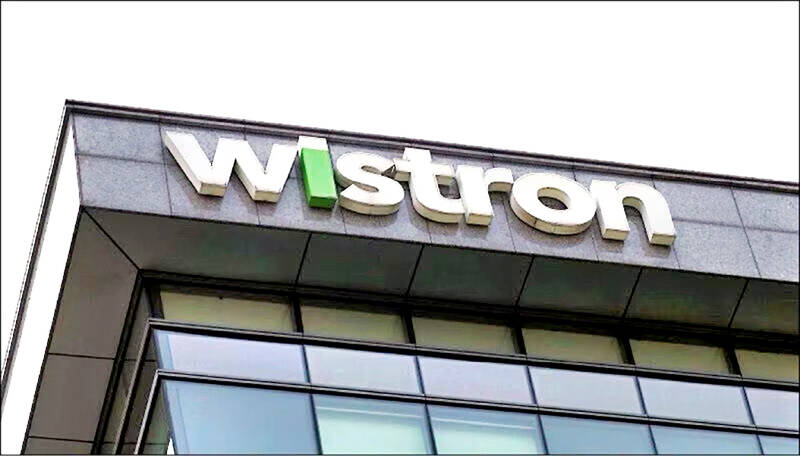Wistron Corp (緯創), which supplies graphics processing unit (GPU) server modules to Nvidia Corp, yesterday reported its strongest first-quarter net profit of NT$3.52 billion (US$108.60 million), driven by robust artificial intelligence (AI) server demand.
That was a 5.6 percent expansion from NT$3.34 billion in the fourth quarter last year.
On an annual basis, net profit spiked from NT$174 million in the first quarter of last year, aided by foreign exchange gains of NT$2 billion in the first quarter.

Photo: EPA
Earnings per share rose to NT$1.24 last quarter, compared with NT$1.18 in the fourth quarter of last year and NT$0.06 in the first quarter of last year.
Gross margin dropped to 7.2 percent last quarter from 9.29 percent in the prior quarter. However, that was still an improvement from 7.01 percent a year earlier.
Wistron yesterday said it booked an asset disposal loss of US$4.6 million last quarter from a deal in which it sold iPhone assembling facilities in India to Tata Electronics Private Ltd for US$130.8 million.
The company said it plans to raise capital expenditure for its plant in Hsinchu County’s Hukou Township (湖口) to US$2.29 billion, up about 43 percent from its original budget of NT$1.6 billion, to cope with new business development and strategic planning needs.
Based on the new budget, the machinery and equipment investment would increase to NT$1.73 billion from NT$1.13 billion, while the investment in building improvements would go up to NT$563 million from NT$472 million, Wistron said.
Wistron makes servers, industrial computers, AI and networking devices at the Hukou plant.
The company in March said that revenue from AI products — GPU-based AI servers, GPU accelerator cards, AI modules and AI systems — would triple this year on an annual basis.
Total capital spending this year would stand at NT$14 billion on account of capacity expansions in Taiwan, Vietnam and Mexico, the company said.
It also plans to inject fresh capital of US$15.5 million into Alpha EMS Corp, its newly acquired, wholly owned US subsidiary, to meet its capital expenditure and operational funding requirements, Wistron said.
Additionally, Alpha EMS would lease a facility from LIPT BIXBY III LLC in California. It would also obtain right-of-use assets for real-estate acquisitions within a limit of US$24.85 million for a period of 10 years and four months.

When an apartment comes up for rent in Germany’s big cities, hundreds of prospective tenants often queue down the street to view it, but the acute shortage of affordable housing is getting scant attention ahead of today’s snap general election. “Housing is one of the main problems for people, but nobody talks about it, nobody takes it seriously,” said Andreas Ibel, president of Build Europe, an association representing housing developers. Migration and the sluggish economy top the list of voters’ concerns, but analysts say housing policy fails to break through as returns on investment take time to register, making the

‘SILVER LINING’: Although the news caused TSMC to fall on the local market, an analyst said that as tariffs are not set to go into effect until April, there is still time for negotiations US President Donald Trump on Tuesday said that he would likely impose tariffs on semiconductor, automobile and pharmaceutical imports of about 25 percent, with an announcement coming as soon as April 2 in a move that would represent a dramatic widening of the US leader’s trade war. “I probably will tell you that on April 2, but it’ll be in the neighborhood of 25 percent,” Trump told reporters at his Mar-a-Lago club when asked about his plan for auto tariffs. Asked about similar levies on pharmaceutical drugs and semiconductors, the president said that “it’ll be 25 percent and higher, and it’ll

NOT TO WORRY: Some people are concerned funds might continue moving out of the country, but the central bank said financial account outflows are not unusual in Taiwan Taiwan’s outbound investments hit a new high last year due to investments made by contract chipmaker Taiwan Semiconductor Manufacturing Co (TSMC, 台積電) and other major manufacturers to boost global expansion, the central bank said on Thursday. The net increase in outbound investments last year reached a record US$21.05 billion, while the net increase in outbound investments by Taiwanese residents reached a record US$31.98 billion, central bank data showed. Chen Fei-wen (陳斐紋), deputy director of the central bank’s Department of Economic Research, said the increase was largely due to TSMC’s efforts to expand production in the US and Japan. Investments by Vanguard International

WARNING SHOT: The US president has threatened to impose 25 percent tariffs on all imported vehicles, and similar or higher duties on pharmaceuticals and semiconductors US President Donald Trump on Wednesday suggested that a trade deal with China was “possible” — a key target in the US leader’s tariffs policy. The US in 2020 had already agreed to “a great trade deal with China” and a new deal was “possible,” Trump said. Trump said he expected Chinese President Xi Jinping (習近平) to visit the US, without giving a timeline for his trip. Trump also said that he was talking to China about TikTok, as the US seeks to broker a sale of the popular app owned by Chinese firm ByteDance Ltd (字節跳動). Trump last week said that he had